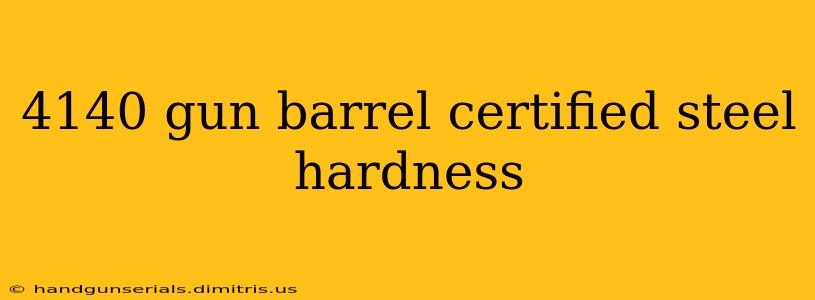4140 steel is a medium-carbon alloy steel renowned for its exceptional combination of strength, toughness, and hardenability. Its widespread use in gun barrels is a testament to these qualities. This post will delve into the specifics of 4140 steel's hardness, explore its other critical properties, and examine its diverse applications beyond firearms.
Understanding the Hardness of 4140 Steel
The hardness of 4140 steel isn't a fixed value; it's heavily dependent on the heat treatment it undergoes. A crucial aspect of manufacturing gun barrels from 4140 steel involves precise heat treatment to achieve the desired hardness profile. This process usually involves:
- Austenitizing: Heating the steel to a specific temperature to form austenite, a high-temperature phase.
- Quenching: Rapidly cooling the austenite, often in oil or a polymer bath, to transform it into martensite, a very hard and brittle phase.
- Tempering: Heating the martensitic steel to a lower temperature to reduce brittleness and increase toughness.
The final hardness of the 4140 gun barrel will typically range from 45-55 HRC (Rockwell C scale). This hardness range ensures the barrel possesses the necessary strength to withstand the pressures generated during firing while retaining sufficient toughness to prevent catastrophic failure. The precise hardness within this range is determined by the specific application and desired barrel lifespan.
Factors Affecting 4140 Steel Hardness
Several factors influence the final hardness of a 4140 steel gun barrel:
- Heat Treatment Parameters: The precise temperature and duration of austenitizing, quenching, and tempering significantly affect hardness.
- Cooling Rate: The rate of cooling during quenching drastically influences the final microstructure and thus the hardness.
- Alloy Composition: While minor variations are common, the exact alloying elements within the 4140 steel also play a role.
- Part Geometry: The size and shape of the gun barrel can impact the effectiveness of heat treatment, potentially causing variations in hardness across the part.
Beyond Hardness: Other Crucial Properties of 4140 Steel
While hardness is a critical aspect for gun barrels, 4140 steel's other properties are equally important for performance and reliability:
- High Tensile Strength: 4140 steel offers excellent tensile strength, meaning it can withstand significant pulling forces without breaking. This is crucial for preventing barrel deformation under firing pressures.
- Good Fatigue Resistance: The steel exhibits good resistance to fatigue failure, which is the weakening and eventual fracture of a material under repeated cyclic loading. This property is vital for the longevity of the gun barrel, especially with high-volume firing.
- Excellent Toughness: Despite its high hardness, 4140 steel retains good toughness, resisting sudden fracture under impact. This ensures the barrel can handle unexpected stresses without catastrophic failure.
- Good Machinability: While hardened 4140 is difficult to machine, in its annealed state it is relatively easy to machine, simplifying the manufacturing process.
Applications of 4140 Steel
While famous for its use in gun barrels, 4140 steel's versatility extends to various applications:
- Automotive Components: Crankshafts, gears, and other high-stress components.
- Aerospace: Landing gear, fasteners, and other structural elements.
- Industrial Machinery: Shafts, gears, and other components demanding high strength and toughness.
- Custom Manufacturing: Applications demanding highly tailored mechanical properties and durability.
Conclusion
4140 steel’s certified hardness, combined with its excellent strength, toughness, and fatigue resistance, makes it an ideal material for gun barrels and many other high-stress applications. Understanding the factors influencing its final properties is critical for ensuring the consistent performance and reliability of components made from this versatile steel. The precise heat treatment and control over manufacturing processes guarantee the exceptional quality and dependability associated with 4140 steel.

